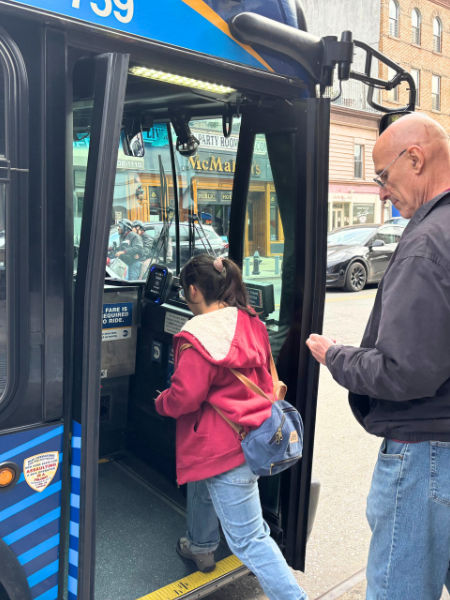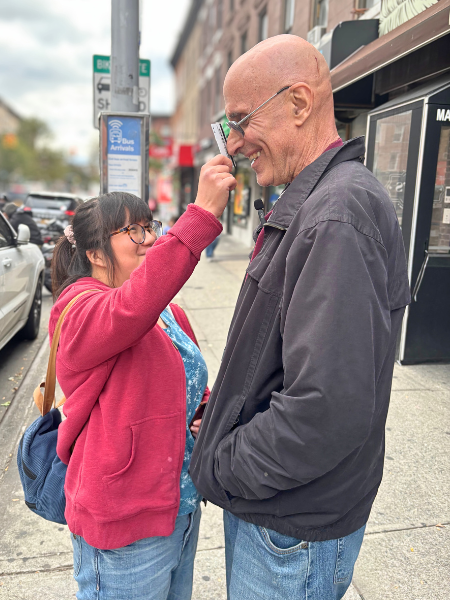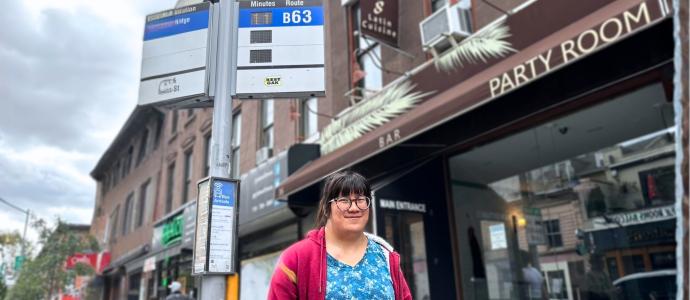Every Tuesday and Thursday morning, Lily Fischer wakes up early in her Brooklyn residence, gets dressed, and makes breakfast before heading out to catch the bus to a local bakery. A few years ago, she might have needed her parents’ help to get ready, but now she’s up on time, fully prepared, and on her way, confidently traveling on her own.
Her new routine is the result of YAI’s travel training program, which teaches people with intellectual and developmental disabilities (I/DD) how to safely navigate New York City’s complex public transit system.

“I feel brave and confident when I travel by myself,” said Lily. “Taking the bus makes me happy and I love riding on it to get around.”
For many people with I/DD, reliable and safe transportation remains one of the biggest barriers to independence. According to the U.S. Department of Transportation’s Bureau of Transportation Statistics, 40.2% of adults aged 18–64 with travel-limiting disabilities made zero trips on the survey day, compared with 21.2% of adults without disabilities. In addition, 14% of adults with disabilities lived in households without a vehicle, making it harder to access work, classes, and social opportunities. Programs like YAI’s help close that gap, giving participants skills that can dramatically expand their worlds.
“Travel training is life-changing,” said Lisa-Dawn Kornegay, the Travel Training Program Supervisor at YAI, who worked closely with Lily throughout her training. “When people learn to travel on their own, they gain so much more than a bus route, they gain confidence, routine, and independence.”
The program pairs each trainee with a YAI instructor who provides one-on-one guidance, beginning with safety basics: reading bus numbers, recognizing landmarks, managing fare payments, and handling unexpected situations. The training gradually moves from full supervision to independent travel, ensuring participants are truly ready to ride on their own.
Training typically takes 10 to 15 days to complete, though progress depends on each person’s learning pace. The program is competency-based, meaning participants must consistently demonstrate all required safety and navigation skills before they can successfully pass and travel independently.
“We teach everything step by step,” Kornegay explained. “It starts with identifying the right bus stop and learning how to signal the driver. We also prepare them for the unexpected—like what to do if they miss their stop. They learn how to get off at the next one, safely cross the street, and retrace their route. It’s about problem-solving and staying calm.”
For Lily and her family, the training was about more than learning to get around; it was about preparing for the future.

“We’re older parents,” said Scott Fischer, Lily’s father. “We’re keenly aware we won’t be here forever. It’s really important that Lily be as independent as possible. We love living in New York, and she does too. If you live in New York, you’ve got to be able to use public transportation.”
The family had first heard about YAI’s program through friends years ago, but the pandemic delayed their plans. When in-person sessions resumed, they were eager to enroll Lily.
“She takes the bus to work twice a week now,” Fischer said proudly. “She also goes across Brooklyn to visit her brother in Bed-Stuy. She’s so independent and she loves it. She’s calmer, more confident, and proud of herself.”
For many participants, that sense of pride comes not only from mastering the transit system but also from the ripple effects it creates in daily life.
“Lily is waking up earlier on her own, making breakfast, keeping track of her time,” Fischer said. “Before, we’d have to wake her up, but now she’s ready before we are. It’s made her more responsible and mature. She feels like she’s five or ten years older.”
Kornegay has seen that kind of transformation often. “Once people realize they can do it, that they can get where they need to go without help. It changes everything,” she said. “It’s not just about getting from point A to point B. It’s about self-esteem.”
The results speak for themselves. Many graduates go on to travel independently to work, classes, or social events. Some even begin helping peers who are just starting out, creating a ripple effect of empowerment within their communities.
For Lily, the impact has been profound. Twice a week, she travels to a bakery in Park Slope, where she takes baking and customer service classes designed for young adults with cognitive disabilities. Eventually, the program hopes she’ll become a brand ambassador for the bakery.
“It’s wonderful,” said Fischer. “She talks about visiting different friends now because she can take the bus. She doesn’t need us to take her anymore. It’s completely opened her world.”

